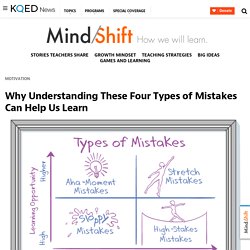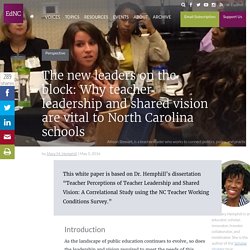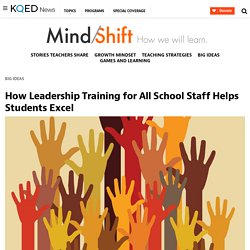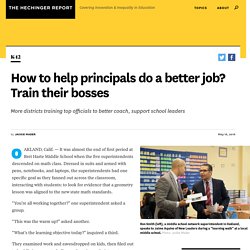

Education Week. Traits of Top Principals: Q & A With New Leaders' Benjamin Fenton - District Dossier. Here's why great principals matter. Effective principals reach all corners of education Strong leadership is essential to any school’s success, and school principals play a vital role in ensuring teachers and students are successful in the classroom.

With strong and flexible leadership, teachers say they feel they have freedom to explore new teaching techniques and approaches. Principals who foster positive school cultures see the returns of such efforts in student achievement, engagement, and teacher satisfaction. In one survey compiled in a new infographic, 69 percent of teachers who said they have effective principals said they felt it was important to put in their best effort, while only 38 percent of teachers reporting unhelpful or ineffective principals said they felt the same. What maker leaders make. School Leaders: Tips for Coaching Your Super Teachers. Anyone who is willing to be a teacher is a superhero in my book.

I admire and honor any person that is willing to interact with students of any age and openly engage with students who are interested, oblivious, and even antagonistic. Super teachers come in all shapes and sizes, but I would like to discuss three specific types: The super in-need teacher: Spiderman The super stoic teacher: Silver Surfer The super imaginative teacher: The Green Lantern. The Spiderman Teacher One teacher that school administrators sometimes deal with is the teacher who is as in need as Spiderman.
Part of the problem stems from her lack of being able to reconcile her alter ego with her super heroine classroom persona. The Silver Surfer Teacher Another teacher that I'll call the Silver Surfer teacher would be a marvelous poker player, because I cannot seem to get past the shiny silver outer shell. The Green Lantern Teacher She is exuberant and enthusiastic. Coaching Questions and Ideas. Julian Treasure: How to speak so that people want to listen. Why Understanding These Four Types of Mistakes Can Help Us Learn. By Eduardo Briceño This article was first published in the Mindset Works newsletter.

A TED speaker coach shares 11 tips for right before you go on stage. Gina Barnett advises a speaker before the annual TED Conference.

Below, her best last-minute public speaking tips. Photo: Ryan Lash/TED The weekend before a TED conference, each speaker rehearses their talk in the TED theater. It’s a chance for the speakers to get to know the space, for our curators to give last-minute suggestions on talk content, and for our speaker coaches to give advice to help each speaker feel their absolute best the day of their talk. During this time, we overheard speaker coaches Gina Barnett, Michael Weitz and Abigail Tenenbaum give some helpful tips that we’d never heard before. We asked Gina Barnett, longtime TED speaker coach and author of the book Play the Part: Master Body Signals to Connect and Communicate for Business Success to share some specifics. Start drinking water 15 minutes before you start talking. Stay tuned to the TED Blog for full coverage of all the talks at TED2016, and also follow the conference live at @TEDTalks.
Professional Learning Other Industries. The Key To Innovation: Making Smart Analogies. The following is the transcript of the closing keynote speach at Sandbox Summit, a fantastic annual conference that brings together all kinds of people interested in kids, technology and learning.

I want to talk today about how we build bridges between old ideas and new ideas, between concepts that are close to home intellectually and those that are far afield. Because it is these bridges, these connections, that produce innovation. There’s a popular notion that innovation arrives like a bolt out of the blue, as a radical departure from previous knowledge—when really, most new ideas are extensions, twists, variations on what’s come before. The new leaders on the block: Why teacher leadership and shared vision are vital to North Carolina schools.
This white paper is based on Dr.

Hemphill’s dissertation “Teacher Perceptions of Teacher Leadership and Shared Vision: A Correlational Study using the NC Teacher Working Conditions Survey.” Introduction. How Leadership Training for All School Staff Helps Students Excel. The Clarksville-Montgomery County School System in Tennessee was facing a common challenge in education — lots of its best people were retiring and there weren’t enough qualified people in the district to fill the leadership positions opening up.

This practical challenge prompted the district to look inward and take steps to develop existing talent with an eye to the future. What started as a desperate need became a concerted emphasis on increasing leadership capacity at all levels of the district and has led to remarkable growth in student achievement by extension. “We’ve tried to establish opportunities for people to gain knowledge of leadership, no matter where they are in the organization,” said Dr. B.J. Worthington, director of schools for the Clarksville-Montgomery County School System. “When we first started balanced leadership, there was this idea that leadership responsibilities were on the instructional side,” said Dr. The same goes for leadership at every level. How to help principals do a better job? Train their bosses. OAKLAND, Calif. — It was almost the end of first period at Bret Harte Middle School when the five superintendents descended on math class.

What a difference a word can make. People spend a good deal of time talking to one another, and in general we do it pretty well.

We might feel excited, angry, embarrassed, or — if we’re lucky — loved, in the course of our daily conversations. So is there any benefit to thinking about a science of talk? Can we really gain anything from scientific analysis of something we “just do”? I believe we can, and I’ve spent the last 20 years studying real talk from real people talking to each other in real time. And while the linguist Noam Chomsky once described conversation as a “disorderly phenomenon,” I can tell you that it’s no such thing. Take this ordinary telephone call between two friends, Nancy and Hyla, transcribed according to the standard conversation analysis transcription system, which includes intonation and the actual sounds being made rather than just the correct spelling of a word (lines under a word represent emphasis and different movements in pitch, the equals sign means that the turns are very rapid):
Simon Sinek: How great leaders inspire action. School Leadership: Resource Roundup. Facebook Edutopia on Facebook Twitter Edutopia on Twitter Google+ Pinterest.
